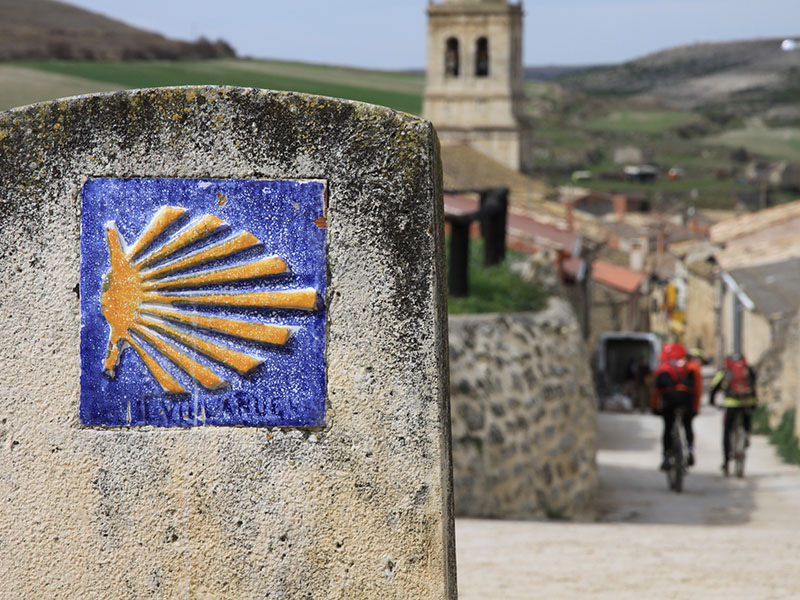
By Elizabeth Vivirito
Travel Writer22 Jun 2019 - 5 Minute Read
Everything hurt. We sat cross-legged at the top of the Pyrenees mountains on the first day of the pilgrimage, our bags tilted on their sides and bulging like stuffed mushrooms. Three women: one whose marriage was in savage freefall; a second mourning the clustered deaths of her mother and sister; and the third whose post-partum depression led to unemployment. All walking to find some sign telling us what to do differently, to hear some voice granting us peace.
My father suggested it after I lost my job: join him in walking an ancient pilgrimage, El Camino de Santiago de Compostela (The Way of St. James). I had seen the Martin Sheen movie The Way, and knew that more than a hundred thousand people each year took the six-week trek across the Iberian Peninsula. But how in the world could I do that, with two young children and no experience hiking?
“We’ll see,” I told my father. My misery seemed too trivial, the maternal guilt too overwhelming, my income nonexistent.
For days after he asked, I kept hearing, “Go,” from somewhere inside of me – even after he had to cancel his plans to join me. In mid-October, not two weeks into unemployment, I arrived with a borrowed backpack and un-broken-in hiking shoes at Saint-Jean-Pied-de-Port, a pastoral, mountain town in southern France. Either this trip would teach me how to relax and focus on what’s important, or all the walking might leave me strong enough to just walk away.
In the evenings, I began joining the circles of pilgrims gathered around small, plastic tables in single-restaurant towns, listening to people with whom I had nothing in life – yet everything on the trail – in common.
This pilgrimage is not luxury travel; lodgings are spare and trim, “lights out” is strictly enforced, and everything feels communal. The first few days, the silence of the countryside threatened to drive me mad. In the evenings, I began joining the circles of pilgrims gathered around small, plastic tables in single-restaurant towns, listening to people with whom I had nothing in life – yet everything on the trail – in common. Still, I felt unmoored.
“The Way” features several well-recognized stops, along with many easily-forgotten ones: the house in Burguete where Hemingway stayed, Pamplona’s Plaza de Toros, and the soaring architecture of Burgos – all spots around which I would design a typical vacation, thrilled by their liveliness, raciones (hearty traditonal dishes), and cheap beer. But now, I'd grown accustomed to the quiet of the Camino, and city noises jarred me. I hurried through them to the hostel, where I would pick my way through the pell-mell backpacks and shoes, check for bedbugs, and flop onto the bed, consumed by every aching muscle.

I had few thoughts of my children, but knew they were safe shuffling between grandparents and my husband, when he wasn’t working, back in the Midwest. I pushed the guilt from my mind. I became comfortable in the rhythm of this new life: its slowness, its intentionality. I meditated on the feelings which gripped me during the day and were lost as soon as my eyes closed at night.
After a particularly brutal 17-mile day, I messaged my dad, “Everything hurts.”
“Keep walking,” he wrote.
Tears stung my eyes. I began to turn outward, listening to stories of my fellow pilgrims to forget my own. At dinner one night I asked a 19-year-old Italian traveling alone, "Why do you walk?"
"I have disease of the lung," he said, then sensing my alarm he sighed, resigned. "It's curable; I need a surgery. I will get this surgery when I return home. I am just frightened."
There was something about how he told his story – the way he picked at the hongos and twirled his beer mug in a tight circle – that made me doubt him. There is no cure, I thought. Nothing is certain.
I complained a little less about what hurt after that. Perhaps we wander not to get lost, but simply to lighten our loads. Weeks later, that’s exactly how I returned home.
This story was a shortlisted finalist in the 2019 World Nomads Travel Writing Scholarship.
Discover similar stories in
transformation
Travel Writer
Elizabeth is a writer and traveler. Her career has sent her to dozens of countries around the world, working hard and traveling slowly.




No Comments